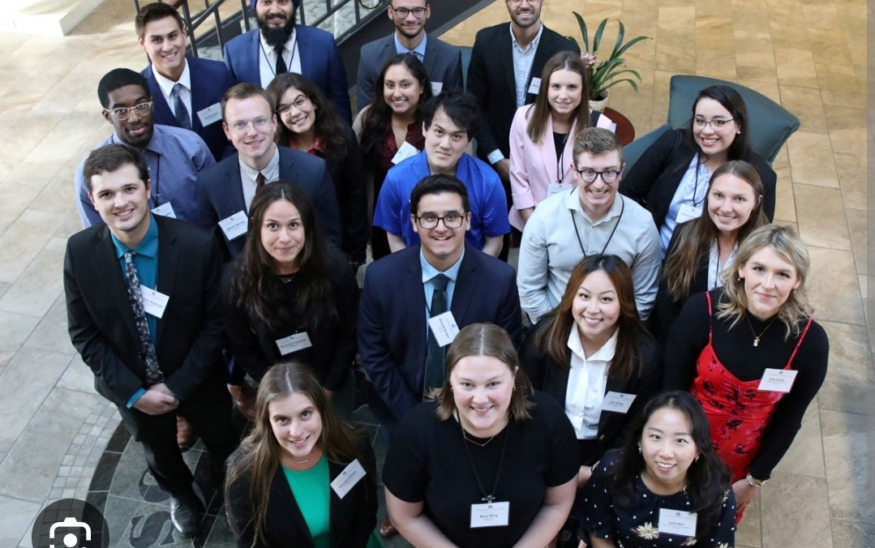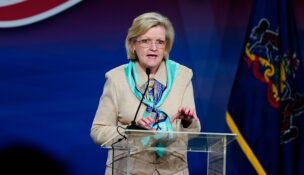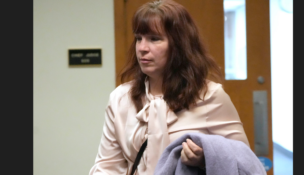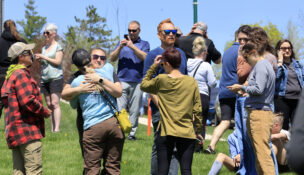UW-Madison law school professor gashes State Bar, law school DEI efforts in scathing email
By: Steve Schuster, [email protected]//January 22, 2024//
UW-Madison law school professor gashes State Bar, law school DEI efforts in scathing email
By: Steve Schuster, [email protected]//January 22, 2024//
The State Bar of Wisconsin’s diversity efforts don’t exactly make Dr. Martin Luther King Jr.’s dream a reality, according to a recently filed federal lawsuit and University of Wisconsin-Madison clinical law professor Steven Wright who serves faculty advisor to the school’s Black Law Student Association.
Wright sent a scathing email to UW Law students over Christmas break warning students not to participate in the State Bar of Wisconsin’s Diversity Clerkship “Sh*tty program,” that has been recently subject to a Federal Lawsuit.
“I strongly encourage you not to participate in this sh*tty program that rarely admits people who look like us and that will no doubt share all your private information with plaintiffs hostile to your interests,” Wright wrote in his December 2023 email.
The Wisconsin Institute for Law & Liberty (WILL) argues the State Bar of Wisconsin’s promotion of alleged discriminatory DEI practices, including its flagship “Diversity Clerkship Program,” is unconstitutional because it discriminates on the basis of race, an issue that has come into the spotlight in the wake of a U.S. Supreme Court ruling last summer.
WILL Associate Counsel Skylar Croy said he believes since the program’s inception in 1993, the State Bar has strayed from its original intention.
Wright agreed during a January telephone interview with the Wisconsin Law Journal. Wright said he too believes that the State Bar’s DEI efforts have strayed from their original intention.
In Wright’s email to students he noted the State Bar of Wisconsin’s 2023 diversity clerkship program accepted 25 members, only one of whom was a black UW law student.
Wright said the federal lawsuit against the State Bar’s clerkship program came as no surprise. It is a First Amendment case challenging the State Bar’s use of race as a factor to select clerkship participants, he noted.

In Wright’s email to UW Law students he wrote, “I strongly encourage you not to participate in this shi*ty program that rarely admits people who look like us.”
Wright also took aim the University of Wisconsin Law school.
“The law school supports the program by championing the program on our website and encouraging students to participate. … I doubt the program would exist if the University of Wisconsin — one of two law schools in the state — refused to participate,” Wright wrote in the email.
Further, Wright took issue that the lawsuit now exposes students’ personal information, including personal statements.
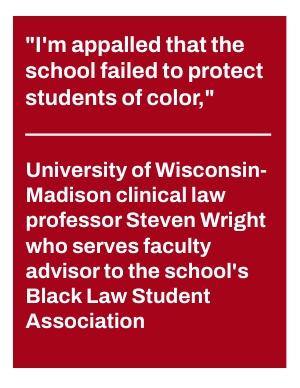
“Therefore, the law school hands are not clean. I’m a litigator — trained by the federal government to fight for people of color — and I’m confident that the law school could have done more to protect the vulnerable students who are now exposed,” Wright noted in his email.
“I’m appalled that the school failed to protect students of color, who it encouraged to participate in the program. The law school, at the very least, could have had the foresight: (1) to warn current and future students that they’re information had been and will be disclosed to the potential plaintiffs, (2) to prepare students for the inevitable lawsuit, and (3) to intervene in the suit early in order to ensure that someone spoke for — and fought for — the twenty-five students who were encouraged by the school to apply. At the very least, the law school leadership should have, by now, helped our exposed students find their own lawyers,” Wright continued.
“In short, like so many recent examples, the University of Wisconsin simply failed to protect you, black students, and, for that reason, you’ll need to protect yourselves. At the very least, I caution against participating in the diversity clerkship program. The law school will clearly not say a word when plaintiffs or the bar put all your information in the streets. In this calculation, I’ll also advise that your chances of selection in this program were low. Last year, for example, despite ample qualified Black applicants, only one UW black student was selected for the program. Such troublesome selection was not an anomaly,” Wright added.
“This Dean’s office, in particular, has a strong track record of failing to respond to legitimate complaints by students of color,” Wright noted in the email.
The Wisconsin Law Journal reached out to both the State Bar of Wisconsin and leadership at the University of Wisconsin Law School. Both declined to comment.
Allegations of State Bar of Wisconsin and University of Wisconsin White Privilege
“Our black students are often forced to take the initiative — relying upon professors and friends and national networks both to make the connections and to receive the counsel that other students, particularly white Wisconsinites receive far more easily,” Wright wrote in the email.
“I’ve been BLSA advisor for several years now, and each year, black students lament Career Services lack of meaningful insight into the specific challenges that black law students face when appearing on the job market, “Wright added.
Wright also criticized the plaintiffs’ in the newly filed federal lawsuit for releasing “sensitive information” about the students.
“I want to be clear: a large amount of the blame here rests with the indifference and/or carelessness of the plaintiff’s counsel. I also want to acknowledge that, while the state bar may administer the program, the law school offers the state program a privileged space in our community,” Wright wrote in the email.
In response, during an interview with plaintiff’s counsel, Attorney Skylar Croy noted how the “sensitive information” which appeared in the appendix of court documents was obtained through public record requests.
“The documents included in the appendix were secured through public records requests made pursuant to Wisconsin’s Freedom of Information Law. The public agencies fulfilling the requests were responsible for ensuring privacy redactions required by state law. We went above-and-beyond to redact candidates’ names and student identification numbers when the providing agencies had not done so. We also point out that Wisconsin law requires that agencies make available through the public-records process documents regarding candidates for public employment. See generally Wis. Stat. 19.36(7),” Croy said.
As previously reported by the Wisconsin Law Journal, other groups are excluded under DEI programs. DEI is supposed to include other groups too: Asians, Latinos, Native Americans, etc.
In a 2022 report, the Anti-Defamation League said, “Jews are being excluded from DEI strategies, despite facing growing rates of antisemitism in the workplace and beyond.
What does DEI include? Should it also include religions?
“All we do is create winners and losers based on the people we do and don’t like. Some races are privileged, and others are excluded. Being Jewish is a minority, but it’s not one of the attributes being preferred by these programs,” said Attorney Daniel Suhr, the plaintiff in the recently filed federal lawsuit.
“The State Bar’s attitude of how much we can get away with is the wrong attitude. The point of this lawsuit is you can’t get away with this any longer. You have to follow the constitution,” Suhr added.
According to court documents obtained by the Wisconsin Law Journal, the State Bar of Wisconsin is allegedly violating Wisconsin attorney’s First Amendment right to free speech under Keller v. State Bar of California, in which the United States Supreme Court held that an association like the bar cannot compel an objecting member to fund activities that are not “germane” to a constitutionally permissible justification for mandatory membership. 496 U.S. 1, 13–14 (1990).
As previously reported, some of the named defendants in the lawsuit include:
- Dean Dietrich – president State Bar of Wisconsin
- Jane Ellen Bucher – president-elect
- Margaret Wrenn Hickey – past-president
- Frances Coyer Munoz – secretary
- Deanne M. Koll – treasurer
- Joseph Cardamone III – chairperson of the Bar Board of Governors
- Larry Martin – executive director.
Legal News
- Wisconsin lawyers file University of Wisconsin public records request seeking answers to protests
- Wisconsin Supreme Court issues orders amending Supreme Court rules and Wis. Stats.
- EXCLUSIVE: Former Milwaukee ‘big law’ partner attacks news media for bias against Trump
- Former Milwaukee election official fined for obtaining fake absentee ballots
- Contract dispute prevents airing of 15 regional sports networks, impacts Brewers
- Wis. middle school focuses on recovery as authorities investigate shooting
- Gov. Evers seeks applicants for Sheboygan and Green County Sheriffs
- North Carolina man who harbored Nazi memorabilia and attacked Black and Latino men sentenced to 41 months
- Nation grieves with families of officers killed in NC
- Amended complaint filed in federal court against State Bar of Wisconsin seeks punitive damages
- United Healthcare suit against cancer drug distributor time-barred
- Trump’s Wisconsin visit warns of jail time if he violates a trial gag order
WLJ People
- Power 30 Personal Injury Attorneys – Russell Nicolet
- Power 30 Personal Injury Attorneys – Benjamin Nicolet
- Power 30 Personal Injury Attorneys – Dustin T. Woehl
- Power 30 Personal Injury Attorneys – Katherine Metzger
- Power 30 Personal Injury Attorneys – Joseph Ryan
- Power 30 Personal Injury Attorneys – James M. Ryan
- Power 30 Personal Injury Attorneys – Dana Wachs
- Power 30 Personal Injury Attorneys – Mark L. Thomsen
- Power 30 Personal Injury Attorneys – Matthew Lein
- Power 30 Personal Injury Attorneys – Jeffrey A. Pitman
- Power 30 Personal Injury Attorneys – William Pemberton
- Power 30 Personal Injury Attorneys – Howard S. Sicula
